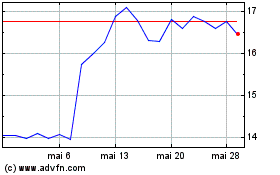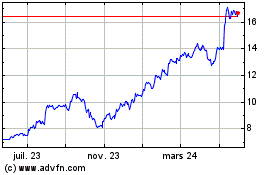Teva Settles Foreign Corruption Probe for $519 Million -- 2nd Update
22 Décembre 2016 - 9:48PM
Dow Jones News
By Samuel Rubenfeld and Austen Hufford
Teva Pharmaceutical Industries Ltd. agreed to pay $519 million
to settle U.S. charges that it violated U.S. foreign-bribery law in
its operations in Ukraine, Mexico and Russia.
The Israeli company, which is the world's largest maker of
generics by sales, will pay the largest criminal fine imposed by
the U.S. government against a pharmaceutical firm for violating the
Foreign Corrupt Practices Act, prosecutors said. The law, jointly
enforced by the U.S. Justice Department and the Securities and
Exchange Commission, bars the use of bribes for foreign officials
to get or receive business.
The U.S. has extensively enforced the FCPA on pharmaceutical
firms over the years following a 2010 industry sweep. The sector,
which increasingly does its business in foreign markets, faces
heightened FCPA exposure in countries with national health systems,
where doctors are considered public officials. In 2016,
pharmaceutical giants GlaxoSmithKline PLC, AstraZeneca PLC and
Novartis AG all settled cases involving FCPA violations.
Teva entered into a deferred-prosecution agreement that charges
the company with violating the antibribery provisions of the FCPA,
and it agreed to pay a $283.2 million criminal fine, continue to
cooperate with a U.S. investigation and retain a compliance
monitor. The Russian subsidiary pleaded guilty. The parent company
also agreed to pay $236 million in disgorgement and interest to the
SEC.
Last quarter, Teva set aside $520 million for a possible
settlement. Erez Vigodman, Teva's president and chief executive,
said in a statement Thursday that the conduct leading to the
investigation had ended years ago, calling the behavior
"regrettable and unacceptable."
According to court documents filed in the case, Teva executives
and Russia-based employees paid bribes to a high-ranking Russian
government official intending to influence him to increase sales of
Teva's multiple sclerosis drug, Copaxone, during annual purchase
auctions held by the Russian health ministry. Between 2010 and at
least 2012, under an agreement with a repackaging and distribution
company operated by the official and owned by his wife, Teva earned
more than $200 million in profits on Copaxone sales to the Russian
government, the documents say.
Overall, according to the U.S., Teva made more than $214 million
in illicit profits.
The company disclosed in August 2012 that it received an SEC
subpoena, and the Justice Department joined the investigation
months later. Teva's statement on Thursday said that after learning
of FCPA concerns in 2012, the company began an internal
investigation, hired independent counsel and conducted a global
risk assessment. It later named a global head of compliance and
updated its policies and procedures.
Teva said that none of the employees involved in improper
payments are still employed by the company, including in Russia,
where in 2013 the entire leadership team was replaced.
"The Teva of today is a fundamentally different company," said
Mr. Vigodman, in the statement.
Write to Austen Hufford at austen.hufford@wsj.com
(END) Dow Jones Newswires
December 22, 2016 15:33 ET (20:33 GMT)
Copyright (c) 2016 Dow Jones & Company, Inc.
Teva Pharmaceutical Indu... (NYSE:TEVA)
Graphique Historique de l'Action
De Juin 2024 à Juil 2024

Teva Pharmaceutical Indu... (NYSE:TEVA)
Graphique Historique de l'Action
De Juil 2023 à Juil 2024
